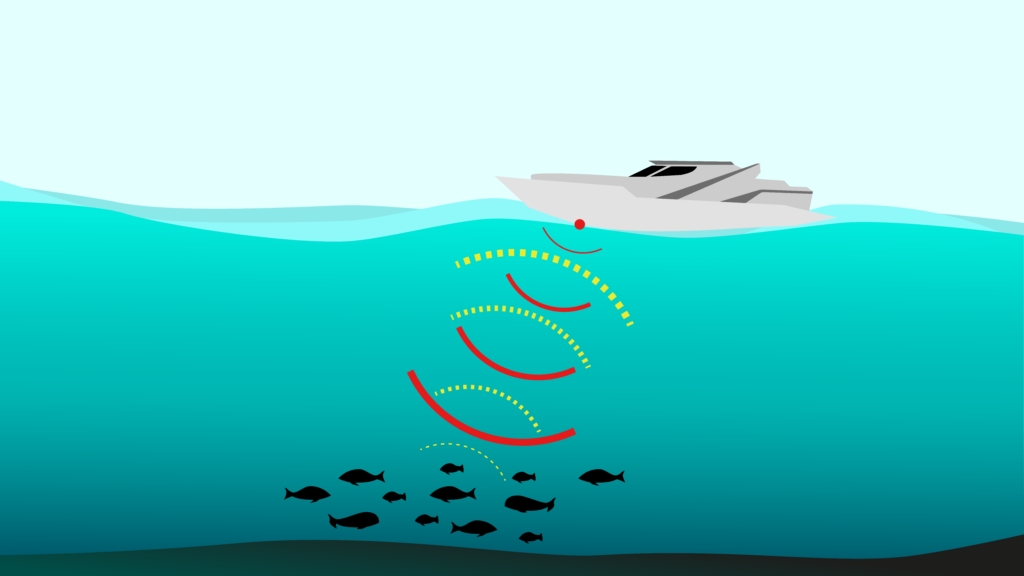Underwater Noise Emissions API
Underwater noise level insights for enhanced environmental monitoring
Harness the power of our API solutions to integrate real-time noise emissions for any vessel and get an estimation of Sound Exposure Level.
{
"sound_exposure_level": 165.5,
"duration": 345600000,
"lloyds_comparison": {
"within_limits": true,
"threshold": 180.0
},
"bureau_veritas_comparison": {
"within_limits": true,
"threshold": 175.0
}
}
"sound_exposure_level": 165.5,
"duration": 345600000,
"lloyds_comparison": {
"within_limits": true,
"threshold": 180.0
},
"bureau_veritas_comparison": {
"within_limits": true,
"threshold": 175.0
}
}

Acoustic Impact Assessment
Measure Sound Level Exposure for any vessel worldwide and assess environmental impact.
Compare acoustic impact with Lloyds and Bureau Veritas standards to ensure compliance and protect marine life.
Key Metrics:
Sound Exposure Level
Duration Monitoring
Standards Compliance
Ensure your vessels meet international noise emission standards.
Automatically compare noise levels with Lloyds transit requirements and Bureau Veritas standard requirements to maintain compliance.
Supported Standards :
Lloyds Standards
Bureau Veritas
APIs
Easy Integration
Integrate in Minutes
Our RESTful API is designed for quick and easy integration into your existing systems. Follow these simple steps:
- Comprehensive Documentation
- Webhook Security
- Error Handling
Input Parameters
Vessel Identification
IMO or MMSI to identify vessel type
Port of Departure
UNLOCODE of departure port
Port of Arrival
UNLOCODE of arrival port
Output Parameters
Sound Exposure Level
Measured in Hertz (Hz)
Duration
Estimated voyage duration in milliseconds
Standards Comparison
Comparison with Lloyds and Bureau Veritas requirements
Sample Response:
{
"sound_exposure_level": 165.5,
"duration": 345600000,
"lloyds_comparison": {
"within_limits": true,
"threshold": 180.0
},
"bureau_veritas_comparison": {
"within_limits": true,
"threshold": 175.0
}
}
"sound_exposure_level": 165.5,
"duration": 345600000,
"lloyds_comparison": {
"within_limits": true,
"threshold": 180.0
},
"bureau_veritas_comparison": {
"within_limits": true,
"threshold": 175.0
}
}
Ready to monitor vessel noise?
Start measuring and analyzing vessel noise emissions today with our comprehensive API.
No credit card required • 30-day free trial • Setup in 5 minutes
Will my remaining credits stay on my account if I cancel or downgrade my subscription?
If you cancel or downgrade, your credit balance will remain on your account until the end of your current billing cycle. Once your billing cycle refreshes, you will get downgraded to the new plan, and your credit balance will be capped at 2x of the monthly credit limit according to your new plan. (For example, if you cancel your plan today, your credit balance on the next billing date will be capped at 50, which is twice the monthly credits for starter plans.)
What are Safecube credits and how do they work ?
Safecube credits serve as the “currency” you use to purchase container data points within our platform. Pre-purchased container credits provide you flexibility and control over your spending, allowing you to select the volume that best suits your needs.By purchasing credits in bulk, you can benefit from discounted rates, improve budget management, and streamline your operations.
Which actions cost credits (or are free)?
When adding a new container in the enrichment panel, the credit cost for this action is shown on the far right in a green cost bubble. The green icon will always indicate the cost for adding a new container.
Do credits roll over ?
No, currently, credits do not roll over to the next billing cycle. This means that any unused credits at the end of your current billing period will expire. However, we understand the value and flexibility that rollover credits can provide, and we are actively planning to introduce this feature in the future. We appreciate your patience as we work to improve our services. Please stay tuned for updates and announcements regarding this upcoming change.

